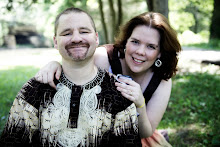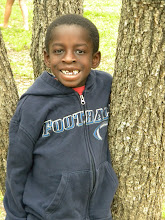Orphans
I've talked about the orphan crisis before on this blog, but it's on my heart again. I don't know if this is an issue that I will ever come to terms with.
I read a post on the Sibley's blog today that, in part, said this:
Virtually everyone we meet in Zambia is raising children not born to them for a
variety of reasons including extreme poverty, sickness, and death. Children
often become sole caretakers of their dying parents as well as younger siblings.
This in and of itself is impossible for my American brain to comprehend. When
children lose a parent for whatever reason, not only are they haunted by the
suffering which ultimately devoured their parent(s); but they also grieve the
loss of their family, moving from roles as sons and daughters to those of extra
burdens for new families. Too often, siblings are scattered to different
relatives that is if they are fortunate enough to have living relatives. These
family members not only grieve the deaths of their loved ones, but they also
shoulder an even heavier load than before as they assimilate more children into
their homes.This creates enormous stress and sorrow for all concerned. Orphaned
children are often resented, becoming little more than unpaid servants in their
new environments. It isn't that adults are cold-hearted. They are doing the best
they can under pressures few of us Americans can even begin to comprehend.
People that are anti-international adoption like to talk about how the extended family system has worked for centuries in Africa without international adoption, and that because children have living family that have taken them in, international adoption shouldn't be part of the equation.
But what we have seen in Ghana (and the Sibley's are seeing in Zambia) is that these "inherited" children, many times, are not at all treated with the love and care they need in order to grow into contributing members of society. The children have only been taken in out of a sense of familial obligation. Family members sometimes look at the children with resentment because they are taking family resources away from their own biological children. As a result many times these inherited orphans are treated no better than slaves...sometimes no better than dogs. They aren't given the same chance at education as the family's biological children. They aren't given the same food, or the same level of comfort at night ("You can sleep on the porch."). Most devastatingly, they aren't given the LOVE that children NEED in order to grow and develop.
I agree with the Sibley's that sometimes all that is needed is a bit of a foot up--a small loan or gift that can be used to start a small business to supplement the family's income. Sometimes. But this is not going to be the answer for all (I would guess MOST) families with inherited orphans. If the family has more money the inherited orphan's living standards may improve somewhat. Maybe they get two meals a day instead of one. Maybe they get a mat to sleep on. But that isn't going to change the attitude that families oftentimes have about these children. The families that treat the children as slaves with less money, are still going to view them as "less than" with more money.
Certainly there are families in Africa that inherit an orphan from extended family and treat that orphaned child as well as their other children. Certainly there are families in Africa that give inherited orphans the same love and nurturing as their other children. But often times this is not the case.
So I remain conflicted. When you read about a child who has been taken in by an uncle and lives in the family compound, your first thought is not "this child needs to be adopted!" I'm the same way--or used to be. I didn't know why we would take these kids out of living family member's homes in order to find adoptive families for them. After all, we need to help "real" orphans, right? These kids have family! Let's give the family a let up so that they can support the child better, and move on!
But they don't have family. Some of these kids don't have family, no matter what the bloodlines say. Family loves you. Family cares for you. Family doesn't treat you as a slave. Family doesn't send your 5 year old self to the streets to beg during the day. Many of these inherited orphans are as utterly alone as any street child in the world--not shown love by anybody.
In places like Ghana people don't even think about formal adoption as an option. They don't realize they have a choice. Our group went to speak about adoption at a school in Ghana and within a few hours families had lined up 20 "inherited orphans" they wanted us to take into care. You think, "Well, why would they all give them up so easily, with so little thought?" It makes sense in so many ways when I think about it now--having met some families in a similar situation in person.
The family no doubt feels some sort of guilt for treating the inherited orphan as "less than," even if they don't do anything about it. The inherited orphan is still a burden to the family, even if the family is only providing enough for the child to continue living. And then someone comes to tell you about this thing called adoption. You can relinquish the inherited orphan you care for to a home that will find a family in America for the child. The child will get a good education. And you, the biological family, can hold your head proud when you tell the rest of the family about your adoption plan. After all, you could have sold the child into slavery. You could have made the child work. But you unselfishly let the child go.
[Quick note: The above paragraph may sound like agencies go into villages hunting for orphans. Just not true--at least not in our case! But once local people learn about adoption there is sometimes a huge positive reaction to the idea. NO child is taken in without thorough investigation, and without making sure there is no other alternative.]
This post is so unorganized and haphazard. Sorry about that. I could write for ages about this and probably never get to the crux of my feelings. Sometimes I feel so sad that children are leaving biological family and going into an orphanage setting for eventual adoption. But then I think about the REALITY in Ghana (and probably many parts of Africa). It's true that the extended family system has been around to take in orphans for centuries. What people seem not to realize is that the extended family system is nowhere close to perfect. It's at least as imperfect a solution as international adoption.
Anita
P.S. Feel a need to say it for this post: My views are MY views--not the views of AAI or of anybody else who may work in international adoptions in Ghana or elsewhere.










6 comments:
Wow! Very thought provoking and heartbreaking...
I think you have to be careful about generalizing. One thing you don't take into account in your post is what happens to the child after he or she "comes home" to his adoptive family outside of Africa, in many or most cases, to a family completely outside of his language, ethnic, and cultural heritage. Different children adapt to this situation differently, and for some, what you call "being loved" is not enough to keep them from feeling lonely, frightened, and severely out of place, especially as puberty hits and questions about identity are raised in the West that might not be so acute if the child was still in the region where he was born (where he could say, my family may be gone but I "belong" here, which is a great deal harder for all kinds of reasons in an international adoption situation). I think you are right to say that we can do something about the material conditions in which such children are raised, either in homes abroad or in Africa. I would prefer that we do it in Africa, simply because I find it exploitative to take an entire continent's children away, even if it is "for their own good." However, I don't think you can automatically say that *emotionally*, as you appear to be doing here, it is automatically better for a child to be raised in an adoptive family far away from Africa than in an extended family in Africa. It depends on the child, the parents, and their experiences in every case. Often we don't know until much later that the adoption was a success or a failure. What we can do is think very carefully before we rip kids, especially older kids, out of their entire cultural context. I think that this problem often gets lost in the enthusiasm over "saving" children.
Hi Anita! I didn't know you even knew about my blog.
What we have discovered in Zambia, especially since we have four Sierra Leonean children in our family, is that most Zambians absolutely do not want their county's orphans removed from Zambia. They made it a point to let us know that while they applaud our adoptions of Isata, Shauna, Steven, and Sia, they do not want us to adopt Zambian children. We explain to these people that our children's very lives were in jeopardy while they lived in war-torn Sierra Leone. That is not the case here.
Please understand that we in no way claim to be authorities when it comes to Zambia's orphans. We are still learning about the problem and what Zambians themselves feel are the solutions to those problems.
That said, if adoption ever does become an acceptable option, AAI will be the ONLY agency I would trust. I have seen and experienced incredible corruption and exploitation of Africa's most vulnerable citizens. Even though I have personally never adopted through AAI, I am blessed with precious friends who have. I don't know if Merrily is open to another country or if Zambia will ever be open in international adoption. So in the meantime, we are working on other solutions.
Keep up the good work Anita! I love reading your blog.
Blessings,
Beckie Sibley
I'm new to your blog, but will mark it as a daily read from now on! Thanks for posting about this important topic. As the adoptive mom of two lovely Ethiopian daughters, I also am conflicted. While I would love to see Ethiopia retain its children, I would also love to see it's children loved, educated, healthy, and able to contribute to the future success of Ethiopia! My daughters have a large family (biological) in Ethiopia and some members here in the US via adoption. We remain closely tied to Ethiopia and have worked hard to forge a close relationship with the Ethiopian side of our family. Here is my main point: we work very hard to keep that tie to Ethiopia, we have adopted not only our daughters but also their culture into our everyday lives, and we remain as close to our Ethiopian family as we do our American family. It is very possible to keep adopted children a part of their birth country, culture and family!
Please come visit my blog at www.taleof2.blogspot.com. I don't have nearly as many intesting posts, but a 2008 resolution is to talk about just this kind of topic!
Thanks again.
~Beth
Thanks for a wonderful post! It really added a new dimension in the adoption process.
Hi Anita,
I found your blog through Owlhaven at Ethiopian Adoption Blogs. I found your post really informative. I have linked to it on my blog at http://forneko.blogspot.com/2008/01/living-relatives.html
Post a Comment